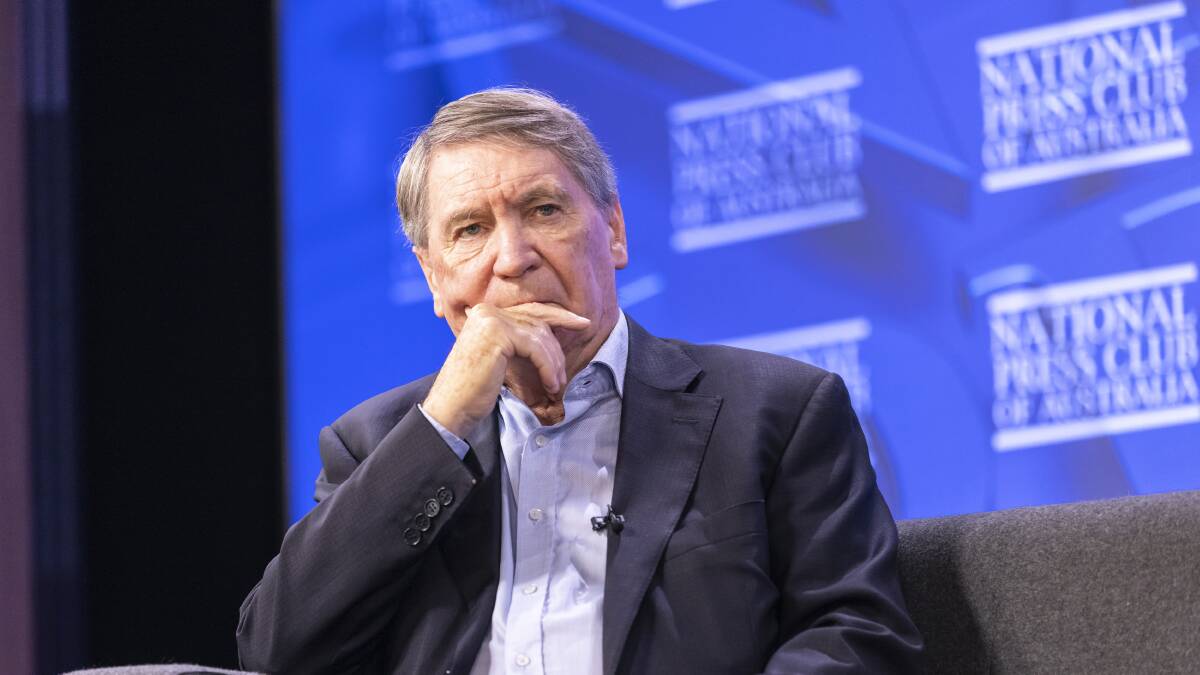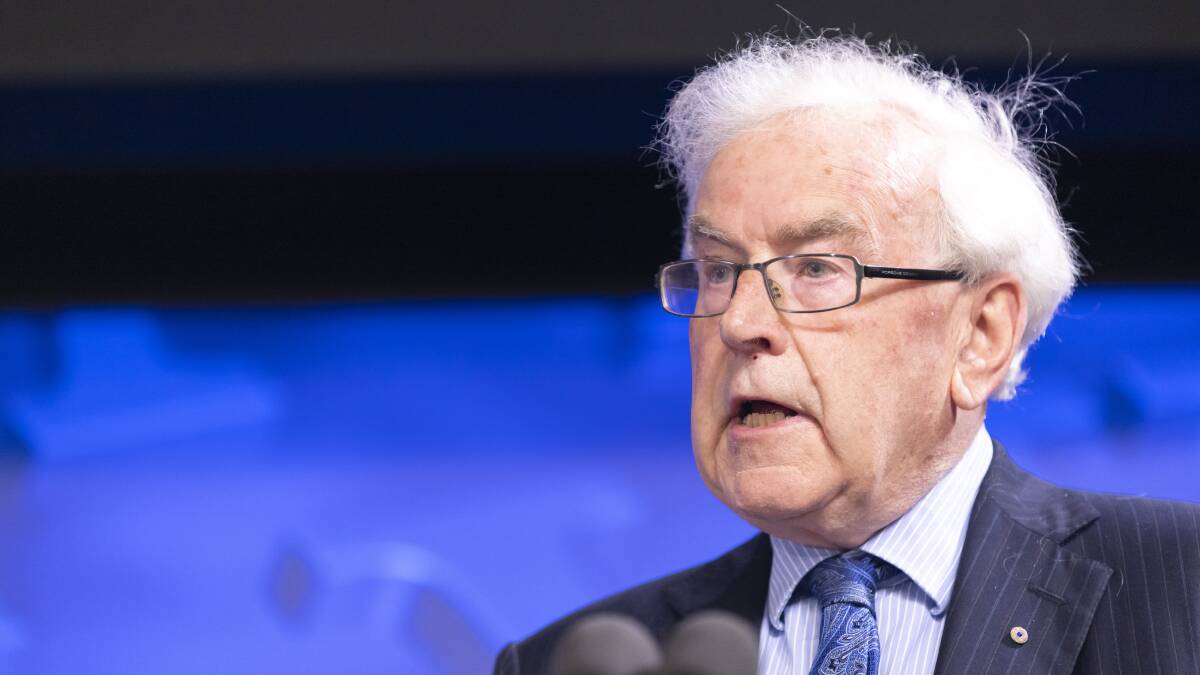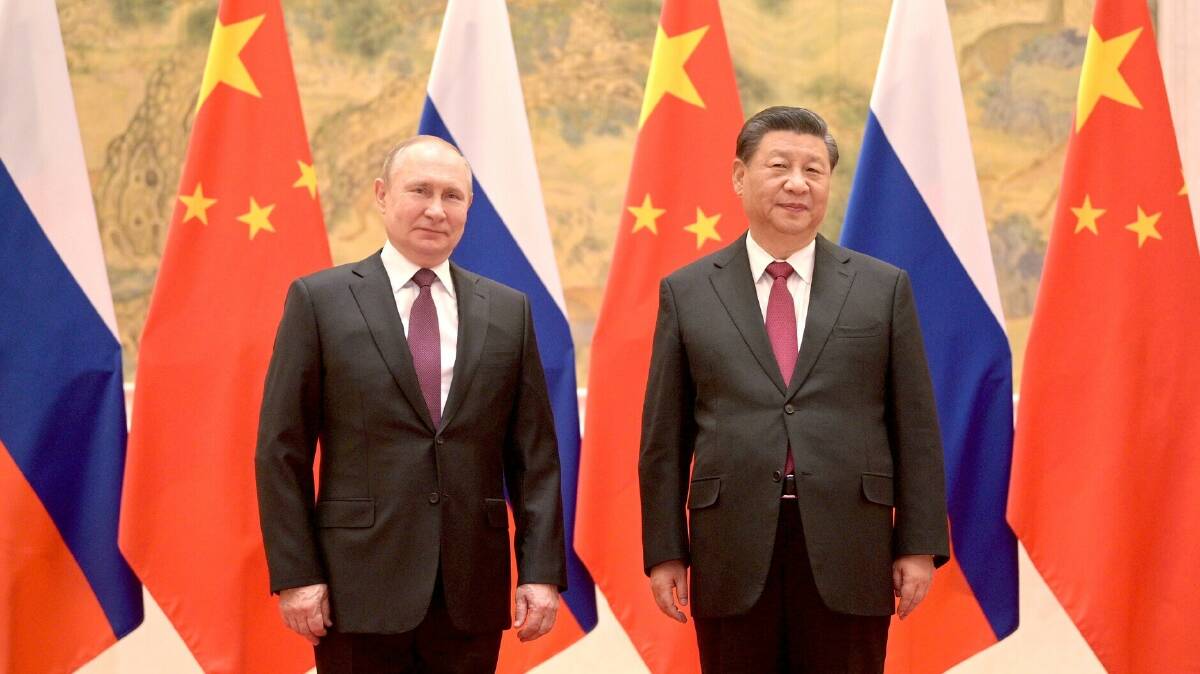
China will work in "murky" areas to support Russia's invasion of Ukraine in order to avoid the same sanctions imposed on the Kremlin, the former head of Defence believes.
Subscribe now for unlimited access.
$0/
(min cost $0)
or signup to continue reading
Former Defence secretary Dennis Richardson and former Defence deputy secretary Paul Dibb told the National Press Club on Wednesday China's "no limits" arrangement with the nuclear power was a fallacy.
Mr Richardson said China abstaining on a recent vote to condemn Russia at the United Nations "silently articulated" the east Asian nation wasn't all in on the partnership.
But it was willing to push the limits to the extent it thinks it can get away with, he added.
It comes as Defence Minister Peter Dutton warned the Russian-Chinese partnership presented "ominous signs" for areas within Australia's own backyard, warning it could embolden China to consider its own ambitions with Taiwan.
Labor foreign affairs spokesperson Penny Wong separately called on Beijing to "do the responsible thing" and condemn Russian President Vladimir Putin's actions.
"I think China will operate in a gray area, in a murky area," the former department head said.
"It will be difficult to actually catch China with its hands in the till sufficient for sanctions to be imposed."
Mr Dibb said the power dynamic between the two had shifted in the decades since the former Soviet Union collapsed with Russia now considered the junior partner.
But Mr Jinping and Mr Putin had become the "closest of friends" in recent years, meeting 30 times over a short period, Mr Dibb added.
"China and Russia are in a quasi-alliance," he said.
"Russia is now supplying high performance leading-edge technology, which it used not to [do]."
Mr Dibb said the close relationship had resulted in Mr Putin aggreeing to build an early warning radar for ballistic missiles for Chinese President Xi Jinping, making the US's chances at targeting China with missiles a "bit more complicated".
"It's not an alliance like NATO - there's no article five, you know, an attack on one is an attack on all but don't underwrite this relationship," he said.
Putin 'drinking his own bathwater'
Mr Dibb, who spent two decades collecting intelligence on former Soviet Union figures within Canberra, had a bruising assessment of Russian President Vladimir Putin's state of mind.
The isolated leader was "drinking his own bathwater" as his military aggression risked escalating the invasion of Ukraine to a full-scale conflict with Europe now "on the precipice" of nuclear war, he said.
The Russian autocrat will not withdraw until Ukraine is split, and guaranteed not to join the NATO military pact.
"[Mr Putin] is drinking his own bath water. He's getting more and more remote, and there's less and less contradictory advice," he said.
Mr Dibb said Mr Putin is motivated by burning humiliation over the fall of the Soviet Union and the Europeanisation of Ukraine, which he views as part of Russia.
Mr Putin has also railed against the expansion of NATO to Russia's borders and frames it as an existential threat to his country's security.
Mr Dibb said the presence of NATO arms in Estonia just 145km from St Petersburg, roughly the same distance between Canberra and Cooma, partly explained his reaction.
"It's not to excuse what's happening, but it's to understand there are different perspectives," he said.
Ukrainian President Volodymyr Zelensky on Tuesday admitted NATO membership is "not on the table", but Mr Dibb predicted Mr Putin would not relent until that is guaranteed by an international treaty.
He also warned the international community would need to recognise annexed Crimea, along with Luhansk and Donbass - enclaves in eastern Ukraine with large ethnically Russian populations - as Russian or independent territory before any withdrawal.
Former Defence and DFAT secretary Dennis Richardson believed Mr Putin will "not give up" until those terms are agreed, which he predicted are a likely outcome.
"If he achieves those objectives and there are not long-term sanctions or long-term punishment imposed by the United States and Europe, then you could argue that Putin wins," he said.
The scale of Russia's attack shocked international analysts, many of whom predicted Moscow's designs were limited to Luhansk and Donbass.
But Mr Dibb said Mr Putin believed he was seizing his moment.
"Fundamentally, and being very crude about it, Putin views Europe as weak and divided. Until recently, by the way, he would have every reason to believe that," he said.
"And he views the United States as a declining power, as does his great ally Xi Jinping."
Mr Richardson predicted that as an autocrat not subject to elections, Mr Putin's staying power could be stronger than his western adversaries'.

"Liberal democracies always have a question about pain thresholds, pressure on governments and the like," he said.
"Over the longer-term, they're the stronger. But certainly over the next few years, Putin will be prepared to suffer more pain than the West will be."
'China has a choice'
Mr Peter Dutton earlier on Wednesday in his address to United States Studies Centre claimed Mr Putin is best understood as an "unreconstructed creature" of the Soviet era who had never accepted the end of the Cold War.
Mr Dutton said the invasion was motivated by Mr Putin's deep-seeded resentment towards the US, and designs on restoring Soviet glory.
"A successful, democratic, Europe-leaning Ukraine has no place in his utterly warped and cynical world view. And so he has set out to destroy it," he said.
"It's becoming clear that Putin's Ukrainian gamble has been a miscalculation. It may very well destroy the man himself."
The invasion raised prospect of closer ties between China and Moscow, after President Xi Jinping and Mr Putin signed a "no limits" cooperation agreement just months before Ukraine was attacked.
China, which has long stressed national sovereignty to reject criticism over Taiwan, has remained relatively silent on the invasion.

Beijing has also refused to join western powers in sanctioning Mr Putin, with reports suggesting it is considering providing economic and military support to Moscow.
Labor foreign affairs spokeswoman Penny Wong urged Beijing to demonstrate "consistency in word and deed", accusing it of failing its responsibilities as a permanent member of the UN Security Council.
"China does have a choice to make," she said.
"We would expect it to do the responsible thing, support the people of Ukraine and its sovereignty, and not supply weapons to Russia."
And after USSC data showed Americans are increasingly ambivalent about engagement with foreign partners, Ms Wong accepted "the nature of US power and influence has changed".
"The United States remains that remains the critical balancing power in our region and in the world, a world with a growing number of conflicts and flash points," she said.
"But its role has evolved to require more central role from allies and partners to defend the rules-based order."



